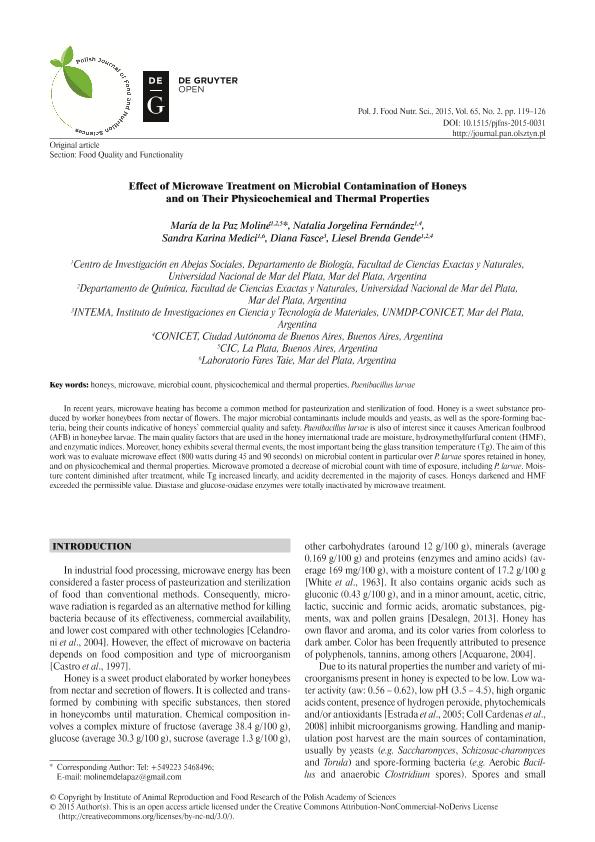Artículo
Effect of microwave treatment on microbial contamination of honeys and on their physicochemical and thermal properties
Moliné, Maria de la Paz ; Fernández, Natalia Jorgelina
; Fernández, Natalia Jorgelina ; Medici, Sandra Karina
; Medici, Sandra Karina ; Fasce, Diana Patricia
; Fasce, Diana Patricia ; Gende, Liesel Brenda
; Gende, Liesel Brenda
 ; Fernández, Natalia Jorgelina
; Fernández, Natalia Jorgelina ; Medici, Sandra Karina
; Medici, Sandra Karina ; Fasce, Diana Patricia
; Fasce, Diana Patricia ; Gende, Liesel Brenda
; Gende, Liesel Brenda
Fecha de publicación:
30/06/2015
Editorial:
Polish Academy of Sciences
Revista:
Polish Journal of Food and Nutrition Sciences
ISSN:
2083-6007
Idioma:
Inglés
Tipo de recurso:
Artículo publicado
Clasificación temática:
Resumen
In recent years, microwave heating has become a common method for pasteurization and sterilization of food. Honey is a sweet substance produced by worker honeybees from nectar of flowers. The major microbial contaminants include moulds and yeasts, as well as the spore-forming bacteria, being their counts indicative of honeys' commercial quality and safety. Paenibacillus larvae is also of interest since it causes American foulbrood (AFB) in honeybee larvae. The main quality factors that are used in the honey international trade are moisture, hydroxymethylfurfural content (HMF), and enzymatic indices. Moreover, honey exhibits several thermal events, the most important being the glass transition temperature (Tg). The aim of this work was to evaluate microwave effect (800 watts during 45 and 90 seconds) on microbial content in particular over P. larvae spores retained in honey, and on physicochemical and thermal properties. Microwave promoted a decrease of microbial count with time of exposure, including P. larvae. Moisture content diminished after treatment, while Tg increased linearly, and acidity decremented in the majority of cases. Honeys darkened and HMF exceeded the permissible value. Diastase and glucose-oxidase enzymes were totally inactivated by microwave treatment.
Archivos asociados
Licencia
Identificadores
Colecciones
Articulos(CCT - MAR DEL PLATA)
Articulos de CTRO.CIENTIFICO TECNOL.CONICET - MAR DEL PLATA
Articulos de CTRO.CIENTIFICO TECNOL.CONICET - MAR DEL PLATA
Articulos(INTEMA)
Articulos de INST.DE INV.EN CIENCIA Y TECNOL.MATERIALES (I)
Articulos de INST.DE INV.EN CIENCIA Y TECNOL.MATERIALES (I)
Articulos(SEDE CENTRAL)
Articulos de SEDE CENTRAL
Articulos de SEDE CENTRAL
Citación
Moliné, Maria de la Paz; Fernández, Natalia Jorgelina; Medici, Sandra Karina; Fasce, Diana Patricia; Gende, Liesel Brenda; Effect of microwave treatment on microbial contamination of honeys and on their physicochemical and thermal properties; Polish Academy of Sciences; Polish Journal of Food and Nutrition Sciences; 65; 2; 30-6-2015; 119-126
Compartir
Altmétricas



